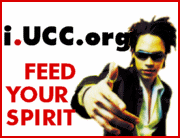Welcoming the stranger
"God is still speaking,"—the identity and advertising campaign of my church, the United Church of Christ—has invited churchwide theological reflection about the Christian vocation of hospitality. What does it mean to welcome others with open arms, into your church and your life? The following was my contribution: a brief meditation on the stories in the Gospel according to John about Jesus' first encounters with his disciples.
Welcoming the stranger, who is no longer a stranger to God
John 1:29,35-39a,43,45-46
The next day [John] saw Jesus coming toward him and declared, "Here is the Lamb of God who takes away the sin of the world!" The next day John again was standing with two of his disciples, and as he watched Jesus walk by, he exclaimed, "Look, here is the Lamb of God!" The two disciples heard him say this, and they followed Jesus.When Jesus turned and saw John's two disciples following, he said to them, "What are you looking for?" They said to him, "Rabbi ... where are you staying?" He said to them, "Come and see."
The story continues:
The next day Jesus decided to go to Galilee. He found Philip and said to him, "Follow me." Philip found Nathanael and said to him, "We have found him about whom Moses in the law and also the prophets wrote, Jesus son of Joseph from Nazareth.... Come and see."But our story began in this way: John saw Jesus ... and declared, "Here is the Lamb of God who takes away the sin of the world." And the day after that John said almost the same thing to two of his disciples: "Look, here is the Lamb of God ... and they followed Jesus."
In his commentary on this account of Jesus' first encounter with his future disciples Karl Barth reminds us of the famous Renaissance painting of the Crucifixion by Matthias Grünewald—a copy of which Barth hung above his desk in his home in Basel, the same desk where he wrote much of the "Church Dogmatics." In this painting, standing below and apart from the Cross, is John the Baptist—one long forefinger pointing up to the crucified Christ. This was for Barth a metaphor for the vocation of a theologian, whose life must point away from herself or himself, and toward the One who takes away the sin of the world.
In the Gospel John does not say, "Come ... and see." It is true that later in story Philip is permitted to say, "Come and see." But John issues no invitation. He says one thing: "Look ... here."
Look.
Look ... anywhere? Look within? Look within and discover your own secret divinity? Look and within yourself discover the path that will lead from your innermost self to a personal relationship with God? No!
Yes, look. But here. Look here. Look away from yourself. Look beyond yourself. Look at this specific point. Look here. Look at the One who takes away the sin of the world.
John's two disciples heard this, and they left John to follow Jesus. They left John, and he let them go without a word. John was not concerned about his personal survival, or the survival of what today we would call his "ministry" or even the survival of his church. John's finger pointed away from himself ... toward the One who takes away the sin of the world.
The invitation is Christ's—not John's. Not the theologian's. Not ours. But Christ's. "Come ... and see." And if, like Philip, we ourselves are allowed to say these words, it is only because Jesus found us first and said, as he said to Philip, "follow me."
And all this means that the One who invites the stranger into relationship is Christ. And we only have to get out of the way. Like John the Baptist, we only have to stand aside—and below—the crucified One whose arms are held open to the stranger who is no longer a stranger to God.
[By Andy Lang, Meditation at Morning Prayer, Confessing Christ steering committee meeting, Jan. 18, 2005, First Church of Christ, Pittsfield, Mass.]



0 Comments:
Post a Comment
<< Home